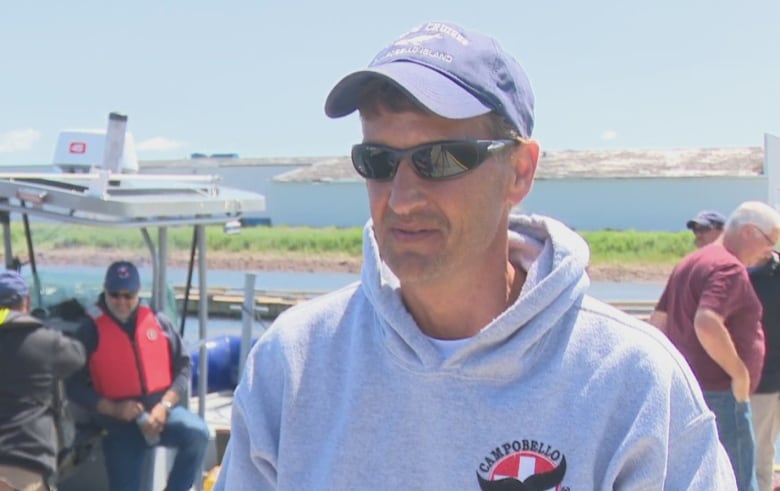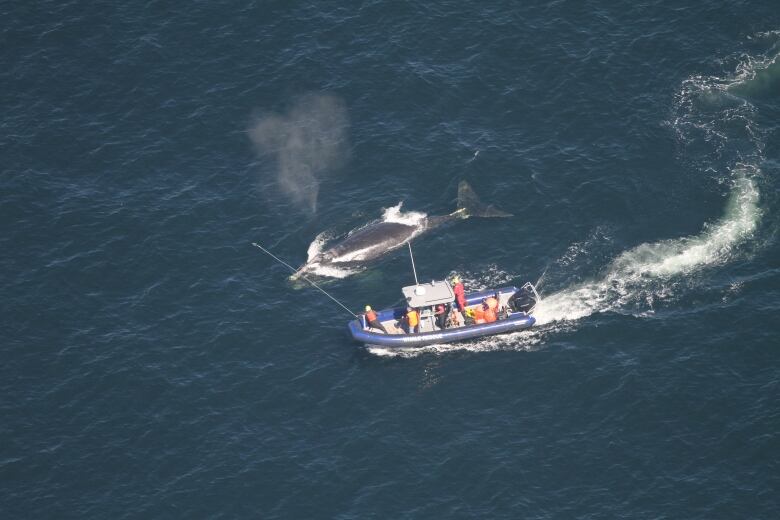3 North Atlantic right whales partially freed from fishing gear
A 4th entangled whale, at least 40 years old, appears to be anchored off Magdalen Islands

As crews triedto figure out how to get to a North Atlanticright whale caught in fishing gear off the Magdalen Islands, rescuers said they've been able to partially free three of the giant mammals this summer.
A massive operationtook place in the Gulf of St. Lawrence during much ofJuly, involving Canadian and U.S. government departments, after three of the endangered animals were found entangled in fishing gear.
On Tuesday, a Fisheries and Oceans surveillance flight spotted a fourth entangled whale, this one about 90 kilometres northwest of the Magdalen Islands.
Because of the whale's remote location, thedepartment was looking Wednesday at options to get close to it, although the weather is not expected to be good enough to go out until early next week.
"This is a really tough case," said Mackie Greene, director of the Campobello Whale Rescue Team.
The whale is an older male, first spotted in 1979 and known as Snake Eyes. It appears to be anchored to the bottom of the ocean, according to Greene.
Fisheries and Oceans said the whale had last been observed on July 16, swimming freely in the Gulf of St. Lawrence.

Greene, a fisherman, spent a large part of July in the waters of the gulf, getting up close to North Atlantic right whales.
His team partially freed two five-year-old male right whales, seen entangledoff the coast of MiscouIsland in northeastern New Brunswick. They removed a heavy weight one of them was trailing.
A third whale, an18-year-old male,was found entangled earlier this summer off the Gasp coast, but has since made its way down to Cape Cod Bay alongMassachusetts.

While the whale was in the gulf, rescuers attached a satellite tag to help track it. The mammal's entanglement was considered both "challenging" and "horrific" by scientists.
Its physical condition deteriorated significantly after it was first seen July 4. According to scientistsin Massachusetts, it was thin and covered in lice. The fishing rope prevented the whale from opening itsmouth at one point.
- Entangled North Atlantic right whale spotted off Magdalen Islands
- Fishermen volunteer to become 2nd right whale rescue team
A rescue team with the Centre for Coastal Studies cut 90 metres of rope during a rescue operation Friday.
"You feel bad, because you know these whales aren't healthy," said Greene.

Although the operation in Canadian waters to free the two five-year-old whales is not as active anymore, the work never ends. If the two animals are spotted again, the rescue team will try to reach them if it's safe to try.
"The animals are only going to become weaker and more emaciated and sicker as the ropes damage them," said Sean Brilliant, senior scientist with the Canadian Wildlife Federation.
"It's never too late and it's never considered a lost cause."
There are only about 400 rightwhalesleft on the planet. Eight have been found dead in Canadian waters since June.
Three of this year's deaths were linked to vessel strikes.












_(720p).jpg)


 OFFICIAL HD MUSIC VIDEO.jpg)
.jpg)



























































































